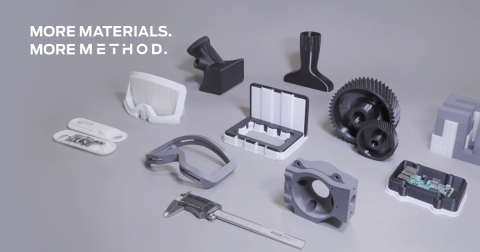MakerBot Continues to Expand the METHOD Platform with New Nylon Material
MakerBot Nylon enables advanced functional prototyping and end-use part production;
2019 marks an impressive time for MakerBot materials, as the company concludes the year with eight materials for METHOD
BROOKLYN, N.Y.--(BUSINESS WIRE)-- MakerBot, a global leader in 3D printing and subsidiary of Stratasys (Nasdaq:SSYS), announces the addition of Nylon to its growing portfolio of engineering-grade materials, bringing the total to eight for the METHOD platform, as the company continues to drive accessibility of industrial additive manufacturing. Optimized for high abrasion resistance, Nylon is widely used for functional prototyping and end-use applications within the automotive, industrial products, and consumer products industries.
This press release features multimedia. View the full release here: https://www.businesswire.com/news/home/20191114005156/en/

MakerBot Materials for METHOD (Photo: Business Wire)
Due to its high flexural, tensile, and impact strength, Nylon has strong mechanical properties and is ideal for applications that require repetitive motions or applied force, such as manufacturing tools and fixtures, articulated parts, snap fits, living hinges, gears, and air intakes. These parts often experience increased heat due to friction and may require flexibility due to interactions with other parts. Nylon also has high thermal properties and is heat resistant up to 180°C.
“The availability of eight materials for METHOD in less than a year underscores our commitment to customers. As we continue to rapidly expand our materials offerings, customers can choose from a variety of materials that offer different mechanical and thermal properties suited to their applications,” said Nadav Goshen, CEO, MakerBot. “Nylon’s unique combination of mechanical properties, accompanied with high heat resistance, opens up a new set of applications for the METHOD platform, such as gears, living hinges, and repetitive motion manufacturing fixtures. Engineers can also increase efficiencies in the workplace by using Nylon for a range of end-use applications.”
Nylon is sensitive to moisture and can easily absorb water in the air. This tendency can cause filament stored in even moderate humidity to produce parts with warping and deformation. METHOD’s sealed material bays can keep Nylon free of damaging humidity. A new spool drying feature will also allow customers to use the METHOD X heated chamber to dry out Nylon spools that have been affected by moisture uptake.
A suite of built-in sensors also helps to ensure materials are stored in their optimal environments—a feature previously only available in traditional industrial 3D printers. In addition, printing Nylon with MakerBot’s water-soluble PVA support material enables users to print complex geometries.
Nylon is expected to begin shipping in early 2020 and will be available in black. For more information, visit https://www.makerbot.com/3d-printers/materials/method-materials/.
About MakerBot
MakerBot, a subsidiary of Stratasys Ltd. (Nasdaq:SSYS), is a global leader in the 3D printing industry. The company helps create the innovators of today and the businesses and learning institutions of the future. Founded in 2009 in Brooklyn, NY, MakerBot strives to redefine the standards for 3D printing for reliability, accessibility, precision, and ease-of-use. Through this dedication, MakerBot has one of the largest install bases in the industry and also runs Thingiverse, the largest 3D printing community in the world.
We believe there's an innovator in everyone, so we make the 3D printing tools that make your ideas matter. Discover innovation with MakerBot 3D printing.
To learn more about MakerBot, visit makerbot.com.
Note Regarding Forward-Looking Statement
The statements in this press release relating to Stratasys’ and/or MakerBot's beliefs regarding the benefits consumers will experience from the MakerBot Nylon material and its features and Stratasys’ and MakerBot’s expectations on the timing of availability of the MakerBot Nylon material are forward-looking statements reflecting management's current expectations and beliefs. These forward-looking statements are based on current information that is, by its nature, subject to rapid and even abrupt change. Due to risks and uncertainties associated with Stratasys' and MakerBot's businesses, actual results could differ materially from those projected or implied by these forward-looking statements. These risks and uncertainties include, but are not limited to: the risk that consumers will not perceive the benefits of the MakerBot Nylon material and its features to be the same as Stratasys and MakerBot do; the risk that unforeseen technical or other difficulties will delay the availability of the MakerBot Nylon material; and other risk factors set forth under the caption “Risk Factors” in Stratasys' most recent Annual Report on Form 20-F, filed with the Securities and Exchange Commission (SEC) on March 7, 2019. Stratasys (or MakerBot) is under no obligation (and expressly disclaims any obligation) to update or alter its forward-looking statements, whether as a result of new information, future events or otherwise, except as otherwise required by the rules and regulations of the SEC.
View source version on businesswire.com: https://www.businesswire.com/news/home/20191114005156/en/
Press
Bennie Sham
MakerBot
bennie.sham@makerbot.com
Source: MakerBot
Released November 14, 2019
